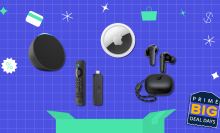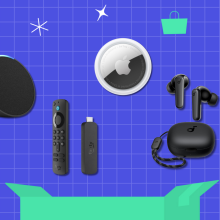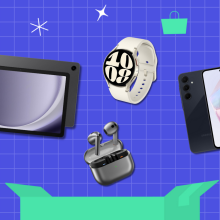Table of Contents





If you want to cheat the system a bit and get your hands on incredible, crisp sound from a pair of headphones under $100, we've got you. You no longer need to choose between a cheap pair of headphones and incredible functions like active noise cancellation and active transparency mode.
Sure, you might be doing an IRL side eye emoji regarding Apple's new AirPods Pro — unveiled during the iPhone 15 keynote in Sept. — but these things will cost you over $249. Don't bother dishing out that much money when you can get earbuds for half the price (with almost the same functionality) or, better yet, over-ear wireless headphones that pack a punch arguably as strong as the AirPods Maxes do. Psst... users have been recently reporting that their Maxes are suffering "condensation death" after being exposed to moisture buildup. Fortunately, the over-ear headphones suggestions we have in store here are all ones you can wear on long, sweaty runs — without stressing about their impending expiration date.
If you're still #TeamApple when it comes to headphones, stick with us for a sec. You'll soon see that these top picks from brands like Sony, JBL, and Soundcore are giving Apple a run for its money. Frugal audiophiles rejoice.
What differentiates budget versus higher-end headphones?
In case we weren't clear enough before, cheaper does not mean worse by any means (and vice versa) when it comes to headphones. Not always, at least.
Yet, the general trend still stands that the "higher-end" a pair of headphones is, the more likely you are to get better sound quality (AKA undistorted bass), longer battery life, and cooler tech-like active noise cancellation.
As PCMag (which is owned by Mashable's publisher, Ziff Davis) explained:
"Currently, certain technologies — true wireless and active noise cancellation are the two most obvious examples — tend to drive up [headphones'] price. That doesn't mean you can't find affordable true wireless in-ears, but the higher-quality options tend to kick in around $150, while most excellent noise-cancelling headphones start around $300. Iconic branding— think Apple, Beats, and Bose, to name a few—also impact pricing. In short, you can pay as little as $50 for good earphones or headphones and far more than $1,000 for audiophile models."
PCMag was quick to clarify that cheap headphones have really improved in recent years. They noted that budget headphones are currently being sold in "more stylish designs, us[ing] more comfortable materials, and fit[ting] more securely than ever." The downside? A cheap paid probably won't last as long as more expensive headphones will (that is, you likely won't be able to enjoy them for "4-5 years with minimal quality decline," according to Mashable reporter Bethany Allard).
Budget headphones are known to leak sound more often than their pricier alternatives, and they'll likely have fewer extras, like the Ambient Aware technology (which increases your awareness of ambient sounds in the environment) and TalkThru system (which amplifies your convo buddy's voice while reducing music volume instantly) featured in some of the pricier JBL headphone models.
Nonetheless, we made it our mission to find headphones — both earbud and over-ear models — that aren't "higher-end" in price but still borrow a lot of standout features from their more expensive counterparts.
Don't believe it? See for yourself by reading our reviews of the best headphones under $100 below.
Best overall: Soundcore Liberty 4 NC

Who it's for:
Anyone who feels slightly uncomfy wearing over-ear headphones (same) will surely enjoy the tiny, lightweight Soundcore by Anker Liberty 4 NC earbuds. These are also for those of us who want the amount spent on a tech product to directly correlate with the number of perks we'll get out of it. The Liberty 4 NCs have no shortage of extra features, from ANC to 3D Surround Sound.
Why we picked this:
Soundcore delivered with these earbuds, which became available for purchase earlier this year. The Soundcore by Anker Liberty 4 NC headphones boast Adaptive ANC 2.0, which basically makes real-time calculations of your external environment and automatically adjusts to the best noise-canceling mode. If you're more of a DIY person, you can manually adjust the level of noise cancellation your earbuds offer, as well as pick the mode of transportation you're currently taking (plane, bus, subway, and car are all options). While the earbuds didn't fully eliminate the din of my city lifestyle when I was testing them out (I could still hear subway chatter even with the "subway" feature turned on), the difference between transparency mode (a-la-AirPods) and ANC mode was noticeable.
Other cool features the headphones come with (accessible via the Soundcore app) include Wind Noise Reduction, 3D Surround Sound, and custom HearID Sound settings which test your hearing sensitivities and also take into account your preferred music genres. The 3D Surround Sound didn't blow me away (though I did feel like my head was almost "wrapped" in the music). Wind Noise Reduction was also imperfect; I took these headphones running on a very windy day and the gusts were audible. However, just the fact that Soundcore even offers these features sets the brand apart from market competitors.
In case you're worried about your new earbuds dying from condensation (cough cough Apple cough cough), don't be. The buds have IPX4 water resistance. Don't go swimming in them, but don't fear breaking a sweat or dancing in the rain while basking in the transformational powers of the Liberty 4 NC headphones' immersive audio.
Battery life: 32 hours with ANC; 40 hours without ANC | Colors: Clear White, Light Blue, Navy Blue, Pastel Pink, Velvet Black | Noise cancellation: Yes
Budget pick: JBL Tune 510BT

Who it's for:
Retailing at $49.95, the price tag on these JBL Tune 510BT headphones is kind of unbeatable — making them ideal for those who are trying to save money this season. Don't expect them to perform magical acts for you, but also don't underestimate this handy JBL pair. If you're not devoted enough of an audiophile to consider professional-level sound quality (or lack thereof) a dealbreaker, you'll soon find yourself carrying around these headphones with you everywhere, like an emotional support water bottle.
Why we picked this:
The Tune 510BT headphones do everything wireless headphones are supposed to: They provide reasonably good sound quality, allow you to switch between two device audio outputs at once, and last days on end. Each of these points comes with a caveat — to be expected when your headphones come out costing less than 50 bucks.
As for sound quality, these JBLs won't provide active noise cancellation (though their ear cups certainly protect your ears from hearing what goes on in the outside environment). That being said, you'll still hear a bit of outside noise mixed with your favorite song.
When testing out the multi-device connection of this JBL model, we found that it was possible but worked in a much slower fashion than its counterparts. In other words, when stopping a video on YouTube and immediately launching into a song on the phone, the headphones didn't immediately reflect this switch: It took them a good three to four seconds to start playing the second audio input.
In terms of battery life, we were impressed with the fact that these headphones were fully drained only after 38 hours — which comes quite close to JBL's promise of a 40-hour battery life. The device gave off a little tone that signified the battery was almost out, but this feature (in a real-life versus for-testing-only setting) is honestly "too little, too late." Unlike in other headphone models, there unfortunately wasn't a voice that announced the exact battery percentage when powering on the Tune 510BTs. To make up for this small flaw, the headphones are equipped with Quick Charge functionality. Just five minutes of them being plugged in via a USB-C connection adds two hours of power. Pretty sweet.
Battery life: 38 hours | Colors: Black, Blue, White, Rose | Noise cancellation: No
Best budget active noise cancellation: JBL Tune 660NC

Who it's for:
Those looking to eliminate the din of their daily life and experience a kind of "sound vacuum" feeling from a pair of headphones will be very happy with the results of the JBL Tune 660NC headphones. They're perfect for savoring the king of all audio features — ANC — without dropping major $$$ on the privilege. Also, this could potentially be the best pick for Android users from this entire roundup, given that they allow you to "Fast Pair" to Android devices. ("Fast Pair" is essentially automatic detection of nearby Bluetooth devices, similar to how nearby AirPods pop up on an iPhone screen, giving you the option to pair without browsing through the chaotic Bluetooth device menu.)
Why we picked this:
JBL literally said: How about we make the JBL Tune 660NC headphones almost identical to the Tune 510BT headphones... but add active noise cancellation for $50 more?
Besides boasting ANC, another perk of the JBL Tune 660NC model is that it has dual LED lights on its exterior: One of which shines white if ANC is connected and the other which either flashes blue or remains solid blue to indicate Bluetooth connectivity status. This truly takes the guesswork out of figuring out whether you've set up your headphones correctly — and is especially handy considering these headphones lack JBL app compatibility. LED lights on the 660NC pair also give battery stats ("Low," "Charging," or "Fully Charged").
Speaking of charging, five minutes provides two extra hours of playback (which kind of seems to be the JBL "Golden Rule"). In terms of battery life in general, if you constantly play music with active noise cancellation enabled, it's gonna cost you: Your JBLs will take 40 hours to drain completely with ANC on and 51 hours with the function turned off. 11 more hours of listening time or a blissful, cocoon-like audio experience — make your choice.
As far as audio quality is concerned, I was satisfied with the "immersive" feel of these headphones' sound and the rich bass/treble contrasts (especially as compared to their JBL Tune 510BT counterparts). The ANC didn't work flawlessly, with some sound still leaking into the headphones with the feature turned on; yet, switching back and forth between "no ANC" and "ANC" made it clear that these JBLs eliminate about 80%, give or take, of the noise in busy environments.
Battery life: 40 hours with ANC; 51 hours without ANC | Colors: Black, Blue, White | Noise cancellation: Yes
Best minimal headphones: Sony WH-CH520

Who it's for:
If you don't need all the bells and whistles that come with top-of-the-line headphones, the Sony WH-CH520 will likely check your must-have boxes. To be completely frank, these Sonys look akin to headsets given out on flights — what with their primitive earpads, basic head cushion band, and inability to completely fold into themselves to save space. Yet, functionality sometimes trumps appearances, and this sentiment rings true for the WH-CH520 model.
Why we picked this:
When these babies first come out of their chic packaging, they're juiced up to about 70% power, give or take (a fact announced directly in your ear by a pleasant, Siri-like voice). The learning curve to figuring out how to control them is not steep at all: Press the "+" button twice to skip forward a song, the "-" button twice to go back, and the power button to start or stop.
The compatible Sony headphones app, which you can download thanks to a helpful QR code on the headphones' packaging, is primitive albeit helpful. You can use it to manage connected devices (up to two at once), play around with the sound equalizer, set up "360 Reality Audio" by analyzing your ear shape, and choose whether you want to prioritize sound quality or stable connection. If voice notifications from the Siri-like creature scare you a bit, you can also turn off this function easily on the Sony app.
Beware — the headphones' ear cups are kind of tiny, which can provide an uncomfortable experience for those whose ears are on the larger side. As far as durability goes, we could only infer that snapping the headphones band in two would be an easy task, since this pair felt quite flimsy overall and wasn't all too cushioned. Still, the audio quality of this Sony pair certainly packed a punch. When running in them (pretty comfortable, all things considered), the sound of traffic and the wind was just barely audible — certainly way less audible than you'd expect from such a minimalistic headphone design.
Battery life: 32 hours | Colors: Black, Blue, White | Noise cancellation: No
Best for gaming: Soundcore Space One

Who it's for:
These headphones are massive — reminiscent of a gaming headset (think wide and deep ear cups, a thick band, and an undeniable heaviness). That being said, they aren't really meant for working out (especially not running), unless you don't mind wearing something clunky and heavy on your head while boosting those endorphins. If you're planning on wearing them around the house, on a long plane ride, or during your daily gaming ritual, you'll fall in love with these budget headphones. After all, nothing about them screams "budget" and they're super new on the market.
Why we picked this:
Unlike the previously discussed Sony and JBL over-ear headphones, which have ear cups that aren't too accommodating, Soundcore seems to take "accommodation" to the next level with the Space One headphones. With a floating axis design, rotating ear cups, and a comfy headband, anyone and everyone can find a comfortable fit.
The Space Ones outdo the other headphones we tested in two key ways. The first is (and don't laugh) the fact that they come with a cute, color-coordinated carrying bag. The second is that five quick minutes of charging boosts the power of these headphones not by one hour, not by two hours, but by four whole hours. They also have three mics with an AI algorithm that pinpoints your voice and amplifies it on calls. In case you don't want to hear the voices of others, they are specially designed to reduce crowd noise by up to 98%.
In terms of how this crowd noise reduction feature fared IRL, I would say that the passive noise cancellation aspect of the headphones was more responsible for making it feel like you're in your own musical bubble than the ANC.
The (completely free) Soundcore app is chock-full of add-on features that you can enable at your convenience. One of these is currently in beta testing — it's called Easy Chat and lowers your music volume when it detects speech. While this is theoretically good for calls (no more scrambling to turn off your rap/hip-hop song queue when grandma calls to check in), I once started to sing along to a song, which depressingly turned it off thanks to this feature being enabled. Bear that in mind when toying with all of Soundcore's fancy audio offerings.
Battery life: 37 hours with ANC; 45 hours without ANC | Colors: Black, Blue, White | Noise cancellation: Yes
How we tested these headphones
To bring you this list of the very best under-$100 wireless headphones, we rigorously tested the following headphones over three to four weeks:
When reviewing wireless headphones, we made sure to wear each pair in the following environments for a substantial amount of time:
The outdoors, on runs
In the gym
Inside the apartment
On a busy city street
Amidst people engaged in conversation
The latter two scenarios were particularly illuminating in terms of the devices' ability to tune out the outside world and distracting human voices. While transporting them around from bag to table to the outdoors, it was also insightful to see how portable the headphones were.
Additional factors taken into account during testing include:
Seamless connectivity: The whole point of wireless, Bluetooth-powered headphones is that they'll be able to connect to your devices in no time and bring quality audio straight to your ears. We tested how efficient each pair of headphones was at first pairing with a device and then remembering this connection from there on out.
Audio quality/richness: Sound quality is a pretty subjective measure but, as the adage goes, you'll know it when you hear it. We mainly benchmarked how good the sound was based on how immersive it felt (to the point of being able to call it spatial audio), whether music sounded flat or almost three-dimensional in the headphones, and whether the sound was strong enough to tune out background noise (particularly in a busy city street environment). Since all of these headphones are on the affordable side, this was a big variable to consider. In our opinion, superb audio quality and affordability shouldn't be mutually exclusive — so all of our recommendations ultimately achieve both.
Compatible app functions and perks: It never hurts to have a compatible app that introduces you to the "hidden features" of your new purchase and allows you to fully customize your listening experience — beyond what you can do by simply playing around with the headphones' buttons. The Sony app, for instance, allows users to set up "360 Reality Audio," which brings spatial audio to the next level and makes it feel as if you're listening to a live concert in an intimate venue. The Soundcore app provides quick customer support, common FAQs and answers, the ability to choose the level of noise cancellation you prefer, access to Beta features, and more. In-app settings like these definitely increase headphones' "bang for the buck" dimension.
Multipoint connection: For the busy bees among us, switching between two devices' audio outputs when you have your headphones on can be a true productivity dealbreaker. Fortunately, all of the models we tested included a dual connection function (pairing with up to two devices, simultaneously). We tested out just how well this worked by switching back and forth between two audio inputs (like MacBook and iPhone) in the span of an hour at various speeds and by playing audio from different channels like YouTube, Spotify, and Apple Music.
Battery capacity and charging power: We charged each pair of headphones to 100% and then connected it via Bluetooth to a 24-hour meditation music video on YouTube, playing the video on a loop until the battery percentage drained to zero. For headphones with active noise cancellation, we repeated this process twice (once with ANC on and once with the function off). As far as charging power is concerned, we knew beforehand that all of these headphones have the ability to use only a few minutes of charging to provide hours of playback time. We thus tested how much battery life increased for each pair after only five minutes of being connected to power.
Comfort/durability: This variable revolved around the aesthetic feel of each tested item, how comfortable it was during wear, and how well it was able to withstand daily use. Earbuds, for obvious reasons, are perhaps the most comfortable/convenient due to their lightweight nature. For headphones, we assessed whether their features translated to unnecessary bulk (the Soundcore Space Ones were particularly bulky, in our opinion) and also whether they were travel-friendly (could fold into a tight bundle, came with a case, etc.).
Topics Earbuds








